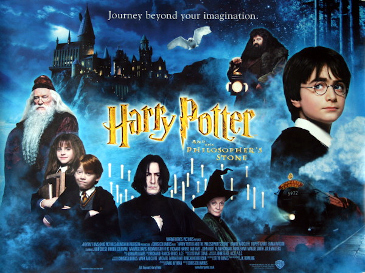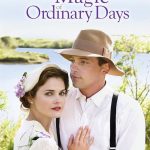Harry Potter and the Philosopher’s Stone
- fanmovies
- October 10, 2024

Harry Potter and the Philosopher’s Stone (2001), directed by Chris Columbus, is the first film in the beloved Harry Potter series, adapted from J.K. Rowling’s bestselling novel. The film introduces audiences to the magical world of Hogwarts School of Witchcraft and Wizardry and sets the stage for Harry Potter’s journey. Here’s a detailed review:
Plot Summary
The story follows an orphaned boy, Harry Potter (Daniel Radcliffe), who discovers on his eleventh birthday that he is a wizard. Rescued from his neglectful relatives, the Dursleys, he is taken to Hogwarts, where he meets friends Ron Weasley (Rupert Grint) and Hermione Granger (Emma Watson). As Harry learns about his past, he uncovers the truth about his parents’ death at the hands of the dark wizard Voldemort. Throughout the school year, Harry, Ron, and Hermione investigate the mystery of the Philosopher’s Stone, a magical object that grants immortality, leading them to confront challenges that test their courage and friendship.
Themes
- Friendship and Loyalty: The bond between Harry, Ron, and Hermione is central to the story. Their loyalty to one another and their willingness to stand together in the face of danger highlight the importance of friendship.
- Good vs. Evil: The film introduces the struggle between good and evil, exemplified by Harry’s fight against Voldemort. This theme is explored through the choices characters make and the consequences of those choices.
- Identity and Belonging: Harry’s journey is also about discovering his identity and finding where he belongs. Transitioning from the Dursleys’ home to Hogwarts symbolizes his transformation and acceptance into a world where he is valued.
Character Development
- Harry Potter: Daniel Radcliffe’s portrayal of Harry captures his innocence, bravery, and sense of wonder. His evolution from a mistreated boy to a confident young wizard forms the emotional core of the film.

- Hermione Granger: Emma Watson’s Hermione is intelligent, resourceful, and fiercely loyal. Her character emphasizes the value of knowledge and the importance of standing up for what is right.
- Ron Weasley: Rupert Grint’s Ron provides comic relief while showcasing loyalty and bravery. His insecurities about his family background and place in the wizarding world add depth to his character.
- Supporting Characters: The film features a strong ensemble cast, including Richard Harris as Professor Dumbledore, Maggie Smith as Professor McGonagall, and Alan Rickman as Severus Snape. Each character adds richness to the story, enhancing the magical atmosphere of Hogwarts.
Direction and Cinematography
Chris Columbus’s direction brings Rowling’s world to life with a balance of whimsy and seriousness. The cinematography beautifully captures the enchanting settings, from the Hogwarts castle to Diagon Alley, immersing viewers in the magical experience. The visual effects are groundbreaking for the time, enhancing the film’s sense of wonder.
Pacing and Editing
The pacing is well-structured, balancing the introduction of the wizarding world with the unfolding mystery of the Philosopher’s Stone. The editing seamlessly transitions between the magical and mundane, keeping viewers engaged throughout the film.
Music and Score
The score, composed by John Williams, is iconic and enhances the film’s magical atmosphere. The main theme is instantly recognizable and evokes a sense of wonder, perfectly complementing the visuals and narrative.
Conclusion
Harry Potter and the Philosopher’s Stone is a charming and captivating introduction to the Harry Potter series, setting the stage for the adventures to come. With strong performances, especially from Radcliffe, Watson, and Grint, as well as a richly developed world, the film appeals to audiences of all ages. It successfully captures the spirit of Rowling’s novel, combining themes of friendship, bravery, and the journey of self-discovery. The film not only serves as an entertaining fantasy adventure but also as a timeless story about the power of love, friendship, and the importance of being true to oneself. It remains a beloved classic that has left a lasting impact on both literature and cinema.











